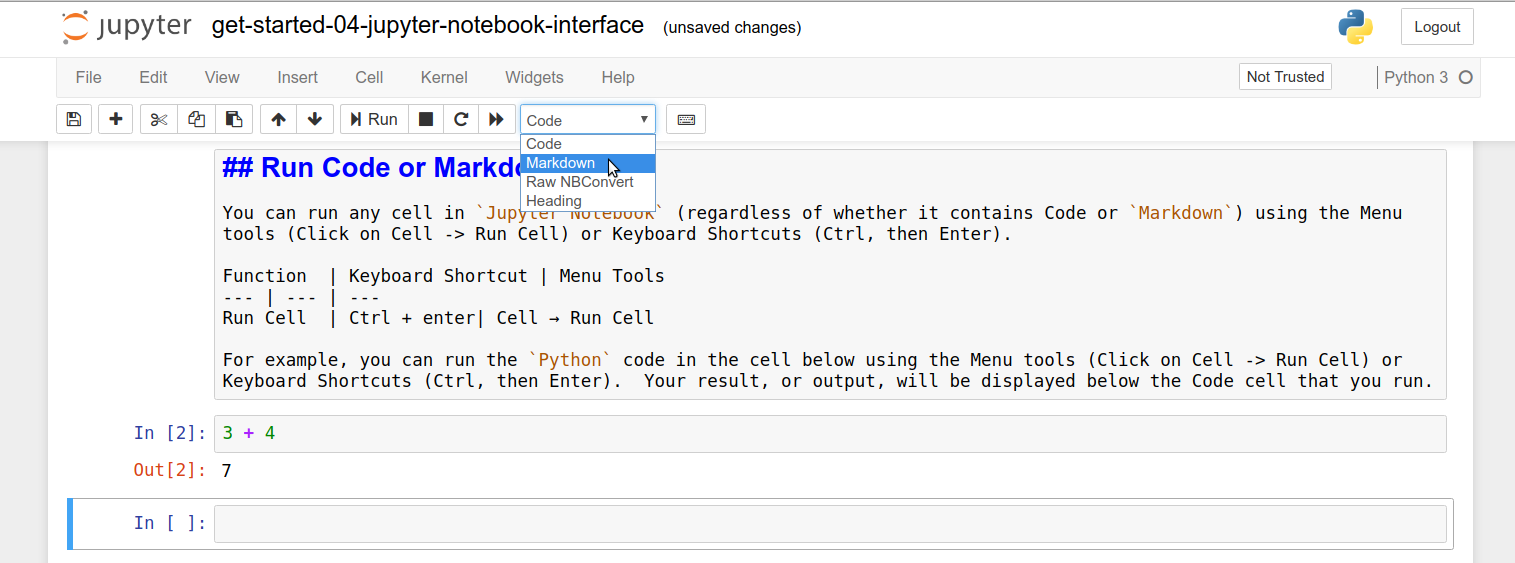

- USE JUPYTER NOTEBOOK ONLINE HOW TO
- USE JUPYTER NOTEBOOK ONLINE INSTALL
- USE JUPYTER NOTEBOOK ONLINE CODE
USE JUPYTER NOTEBOOK ONLINE CODE
I tried running the following code and got this error: import numpy as np I am trying to re-run the code from this github repository : I used this link over here:, and then I opened a new file. I am using a computer with very little space left, so I decided to try to use the online version of Python without explicitly installing anacondas or python. If you prefer to use the Classic Notebook interface, it is still available via the "Help" menu in the menu bar.I am new to the world of Python. Please see the JupyterLab documentation for more details, including a detailed tour of the interface and features. JupyterLab uses a launcher panel with prominent icons.

For larger parallel tasks, you can also start new jobs using Slurm commands from a terminal. You can only have one Jupyter session active at a time, so in order to switch to another job type, you must stop your server (see step 7 above) and restart it with another server option selected. K40 GPU session - 12 cores, 60 GB, 4 hour, 100 GB local scratch, 1 K40 GPU Mangi AMD wide - 24 cores, 45 GB, 4 hours, 75 GB local scratch Mesabi High-mem - 12 cores, 128 GB, 4 hours, 180 GB local scratch Mangi AMD Medium - 2 cores, 32 GB, 4 hours, 64 GB local scratch

Mesabi Interactive - 3 cores, 8 GB, 12 hours, 48 GB local scratch (this is the default option and will usually start very quickly) The "Server Options" form allows you to select the resources requested for that job. Behind the scenes a job is created and scheduled to run for you. Your session is provided by a Jupyter Notebook server running on your behalf on a scheduled HPC resource. Unless you end your session, your server will continue running and consuming resources until the requested time runs out, even if you log out or close your web browser. From the "File" menu at the top of the work area, select "Hub Control Panel" and press "Stop My Server". When you are done working, you should end your session to release the compute resources for other users.You can reconnect to your running session by logging in to (including from another computer or a different location). Your session is hosted by a running job, and will continue running if you close your web browser or even log out.You can browse, open, and manage files via the directory view in the left sidebar. You can start new notebooks, command line terminals, and other resources by clicking icons in the launcher. Once your session starts, you will be redirected to the JupyterLab interface.Usually your Jupyter Notebooks server will start in under a minute, but during busy periods you may have to wait up to several minutes, especially if you have selected one of the larger job types. On the "Server Options" page, select a job type (see below for additional information) and click "Start" to start your session.If your Jupyter Notebooks server is already running, you will be redirected directly to your running session. If you do not already have a running Jupyter session, you will be prompted to "Start My Server".You will be asked to select your group if you belong to more than one group. You will be prompted to log in with your University InternetID. If you are off-campus you will need to connect through the University VPN.
USE JUPYTER NOTEBOOK ONLINE INSTALL
You do not need to install any special software. You can connect to the Jupyter Notebooks service using any modern web browser.

USE JUPYTER NOTEBOOK ONLINE HOW TO
There are many excellent tutorials and videos online that explain how to use Jupyter Notebooks. This is an MSI Beta service and may receive updates at any time. MSI Python tutorial materials provide a useful overview. Notebooks currently supports both the JupyterLab and Classic Notebook interfaces, computation with the Python (version 2 and 3) and R languages, and can also interoperate with user-installed Jupyter environments. This interactive computing environment requires only a web browser, and enables data analysis and visualization on our HPC resources in a shareable, reproducible notebook format. Jupyter Notebooks are available to all users at.


 0 kommentar(er)
0 kommentar(er)
